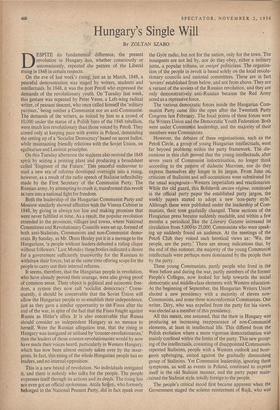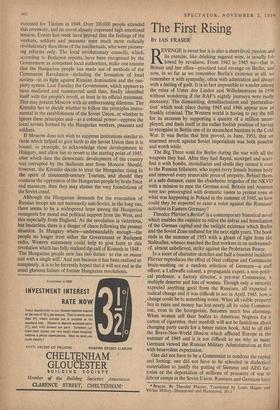Hungary's Single Will
BY ZOLTAN SZABO DESPITE its fundamental difference, the present revolution in Hungary has, whether consciously or unconsciously, repeated the pattern of the Liberal rising in 1848 in certain respects.
On the eve of last week's rising, just as in March, 1848, a peaceful demonstration was staged by writers, students and intellectuals. In 1848, it was the poet Petofi who expressed the demands of the revolutionary youth. On. Tuesday last week, this gesture was repeated by Peter Veres, a Left-wing radical writer, of peasant descent, who once called himself the 'solitary partisan.' being neither a Communist nor an anti-Communist. The demands of the writers, as voiced by him to a crowd of 10,000 under the statue of a Polish hero of the 1848 rebellion, were much less revolutionary than those voiced by Petofi. They aimed only at keeping pace with events in Poland, demanding the setting up of a 'Socialist Democracy' based on secret ballot, while maintaining friendly relations with the Sov,iet Union, on egalitarian and Leninist principles.
On this Tuesday afternoon the students also revived the 1848 spirit by seizing a printing plant and producing a broadsheet called 'Engineer of the Future.' This peaceful endeavour to start a new era of reforms developed overnight into a rising. however, as a result of the radio speech of Stalinist inflexibility made by the First Secretary of the Communist Party. The Russian army, by attempting to crush it, transformed this revolt in turn into a national fight for freedom.
Both the leadership of the Hungarian Communist Party and Moscow similarly showed affinities with the Vienna Cabinet in 1848, by giving in always too late and making promises that were never fulfilled in time. As a result, the popular revolution extended to the provinces, villages and towns, where National Committees and Revolutionary Councils were set up, formed of both anti-Stalinists, Communists and non-Communist demo- crats. By Sunday, as Mr. Denis Healey put it in a message to the Hungarians, 'a people without leaders defeated a ruling clique without followers.' Last Monday these bodies indicated a desire for a government sufficiently trustworthy for the Russians to withdraw their forces, but at the same time offering scope for the people to carry out their internal reforms.
It seems, therefore, that the Hungarian people in revolution, who have already proved their courage, were also giving proof of common sense. Their object is political and economic free- dom, a system they now call 'socialist democracy.' Conse- quently, it should be conceivable that the Soviet Union will allow the Hungarian people to re-establish their independence, just as they gave a similar opportunity to the Finns after the end of the war, in spite of the fact that the Finns fought against Russia as Hitler's allies. It is also conceivable that Russia should consider an independent Hungary as no menace to herself. Were the Russian allegation true, that the rising in Hungary was instigated or utilised by 'counter-revolutionaries,' then the leaders of those counter-revolutionaries would by now have made their voices heard, particularly in Western Hungary, which has now been almost entirely taken over by the insur- gents. In fact, this rising of the whole Hungarian people has no leaders, and no internal opposition.
This is a new brand of revolution. No individuals instigated it, and there is nobody who talks for the people. The people expresses itself through its actions and its deeds. The rising has not even got an official spokesman. Attila Szigeti, who formerly belonged to the National Peasant Party, did in fact speak over the Gyor radio, but not for the nation, only for the town. The insurgents are not led by, nor do they obey, either a military junta, a popular tribune, or emigre politicians. The organisa- tion of the people in revolt is based solely on the local revolu- tionary councils and national committees. These are in fact `soviets' established from below, and not from above. They are a variant of the soviets of the Russian revolution, and they are only demonstratively anti-Russian because the Red Army acted as a repressive force.
The various, democratic forces inside the Hungarian Com- munist Party came into the open after the Twentieth Party Congress last February. The focal points of these forces were the Writers Union and the Democratic Youth Federation. Both were under Communist leadership, and the majority of their members were Communists.
However, the debates of these organisations, such as the Petofi Circle, a group of young Hungarian intellectuals,/ went far beyond problems within the party framework. The dis- cussions in this club proved that the young intellectuals, after seven years of Communist indoctrinatiOn, no longer think according to the pattern of dialectic Marxism, nor do they express themselves any longer in its jargon. From June on, criticism of Stalinists and self-accusations were substituted for the usual scapegoats—Western imperialists and reactionaries. While the old guard, this Bolshevik ancien regime, continued in the official party paper the established party jargon, the weekly papers started to adopt a new 'non-party style.' Although these were published under the leadership of Com- munists, their tone gradually changed. These sections of the Hungarian press became suddenly readable, and within a few months a periodical like the Literary Gazette increased its circulation from 5,000 to 25,000. Communists who were speak- ing up suddenly found an audience. At the meetings of the Petofi Club they voiced such heretical views as : 'We, the people, are the party.' There are strong indications that, by the end of this summer, the majority of the young Communist intellectuals were perhaps more dominated by the people than by the party.
These young Communists, partly people who lived in the West before and during the war, partly members of the former People's Colleges, now looked for help towards the social democratic and middle-class elements with Western education. At the beginning of September, the Hungarian Writers Union elected a new presidency with a majority of eleven non- Communists, and some three nonconformist Communists. otie writer, DCry, who was expelled from the party for his views, was elected as a member of this presidency.
All this meant, one assumed, that the thaw in Hungary was producing an increasing reappearance of non-Communist elements, at least in intellectual life. This differed from the Polish evolution where a more vigorous democratisation was mainly confined within the limits of the party. This new group- ing of the intellectuals, consisting of disappointed Communists, repented Stalinists, people with a Western outlook and bour- geois upbringing, united against the gradually diminishing group of Stalinists. Yet Communist leadership, ignoring these symptoms, as well as events in Poland, continued to express itself in the old Stalinist manner, and the party paper main- ...tained the Stalinist style, totally foreign to the people.
The people's critical mood first became apparent when the Government staged the solemn reinterment of Rajk, who was executed for Titoism in 1949. Over 200,000 people attended this ceremony, and its mood already expressed high emotional tension. Events last week have proved that the feelings of the workers, soldiers and peasants were much more radically revolutionary than those of the intellectuals, who were pioneer- ing reforms only. The local revolutionary councils, which, according to Budapest reports, have been recognised by the Government as competent local authorities, make one assume that the Hungarian people has made use of methods of the Communist Revolution—including the formation of local soviets—in its light against Russian domination and the one- party system. Last Tuesday the Government, which appears to have mediated and manoeuvred until then, finally identified itself with the people's revolt, at least in its official statement. This may present Moscow with an embarrassing dilemma. The Kremlin has to decide whether to follow the principles instru- mental in the establishment of the Soviet Union, or whether to ignore these principles and—as a colonial power—oppress the local soviets formed by the Hungarian workers, peasants and soldiers.
If Moscow does not wish to suppress institutions similar to those which helped to give birth to the Soviet Union then it is bound, in principle, to acknowledge these developments in Hungary, and allow her to revert to the starting point of 1945, after which date the democratic development of the country was corrupted by the Stalinists sent from Moscow. Should, however, the Kremlin decide to treat the Hungarian rising in the spirit of nineteenth-century Tsarism, and should they continue the oppression of the Hungarian people by brute force and massacre, then they may shatter the very foundations of the Soviet creed.
Although the Hungarian demands for the evacuation of Russian troops are not necessarily anti-Soviet, in the long run, there seems to be a widespread hope among the Hungarian insurgents for moral and political support from the West, and this especially from England. As the revolution is victorious, but leaderless, there is a danger of chaos following the present situation. In Hungary where—understandably enough—the people no longer trust either the Government or Budapest radio, Western statements could help to give form to this revolution which has fully realised the call of Kossuth in 1848 : The Hungarian people now has two duties : to rise en masse and with a single will.' And just because it has been realised so completely, it is to be fervently hoped that it will not end in the usual glorious failure of former Hungarian revolutions.



































 Previous page
Previous page